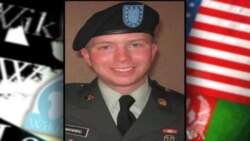FORT MEADE, MARYLAND —
A military judge has begun deliberations in the case of U.S. Army Private Bradley Manning, accused of leaking U.S. secrets and aiding the enemy. Manning's court-martial proceedings are taking place at Fort Meade near Washington, and are winding down after nearly two months.
In closing arguments Friday, defense lawyer David Coombs asked the military judge to consider whether Bradley Manning is a traitor, with no loyalty to the United States, or a young, naïve and well-intentioned soldier and whistleblower whose main motive was saving human lives and bringing about positive change in the world.
The 25-year-old former Army intelligence analyst could get a life sentence if the judge rules he is guilty of aiding the enemy by releasing 700,000 secret files to the anti-secrecy website WikiLeaks.
Those files include thousands of State Department and military emails, messages, reports, and videos including one that shows a U.S. helicopter gunship firing on civilians in Baghdad. In releasing the files, Manning claims he sought to shed light on the actions of the U.S. government and bring about reform.
Manning has pleaded guilty to releasing the files while he was deployed in Iraq. Those charges alone could result in a 20-year prison sentence.
Military prosecutors, in their closing arguments a day earlier, described Manning as an anarchist who released files he pulled from government computers and leaked them for the purpose of gaining notoriety - knowing they would be seen by terrorists including Osama bin Laden.
The prosecutors said Manning - with his training as an intelligence analyst - would have known the information that included detailed reports on roadside bomb attacks on U.S. troops would put the lives of American soldiers in danger.
His attorney on Friday countered the charges, arguing that Manning did not give the files directly and secretly to the enemy, but rather supplied them to WikiLeaks, which the lawyer described as a legitimate news organization.
Coombs accused the prosecution of taking some of the evidence out of context. One example is a photo that Manning took of himself. The prosecution says it shows him smiling after sending files to WikiLeaks. Manning is homosexual. His lawyer on Friday noted the photo shows Manning wearing makeup and a bra and is smiling because it shows him being himself at that moment.
Morris Davis is a retired U.S. Air Force colonel and former chief prosecutor at Guantanamo who testified in Manning's defense. Davis said he does not see Manning as a hero, but believes the government may have gone too far in bringing the aiding-the-enemy charges.
“I don't condone what he did in releasing classified information, and he's pled guilty to that, so I think he ought to be held accountable for what he did. But I think it's a case where the government is overreaching and overcharged in order to make an example of Private Manning to keep others from pondering the same steps that he took in the future,” said Davis.
The case has drawn a number of civil liberties activists to the proceedings. Some have been credentialed as members of the media. On Friday, the judge ordered one of those supporters out of the courtroom for allegedly posting threatening messages regarding some of the court-martial participants.
In his rebuttal Friday, the prosecutor said Manning was not naïve and was fully aware of his actions.
The judge is expected to issue a verdict in the coming days.
In closing arguments Friday, defense lawyer David Coombs asked the military judge to consider whether Bradley Manning is a traitor, with no loyalty to the United States, or a young, naïve and well-intentioned soldier and whistleblower whose main motive was saving human lives and bringing about positive change in the world.
The 25-year-old former Army intelligence analyst could get a life sentence if the judge rules he is guilty of aiding the enemy by releasing 700,000 secret files to the anti-secrecy website WikiLeaks.
Those files include thousands of State Department and military emails, messages, reports, and videos including one that shows a U.S. helicopter gunship firing on civilians in Baghdad. In releasing the files, Manning claims he sought to shed light on the actions of the U.S. government and bring about reform.
Manning has pleaded guilty to releasing the files while he was deployed in Iraq. Those charges alone could result in a 20-year prison sentence.
Military prosecutors, in their closing arguments a day earlier, described Manning as an anarchist who released files he pulled from government computers and leaked them for the purpose of gaining notoriety - knowing they would be seen by terrorists including Osama bin Laden.
The prosecutors said Manning - with his training as an intelligence analyst - would have known the information that included detailed reports on roadside bomb attacks on U.S. troops would put the lives of American soldiers in danger.
His attorney on Friday countered the charges, arguing that Manning did not give the files directly and secretly to the enemy, but rather supplied them to WikiLeaks, which the lawyer described as a legitimate news organization.
Coombs accused the prosecution of taking some of the evidence out of context. One example is a photo that Manning took of himself. The prosecution says it shows him smiling after sending files to WikiLeaks. Manning is homosexual. His lawyer on Friday noted the photo shows Manning wearing makeup and a bra and is smiling because it shows him being himself at that moment.
Morris Davis is a retired U.S. Air Force colonel and former chief prosecutor at Guantanamo who testified in Manning's defense. Davis said he does not see Manning as a hero, but believes the government may have gone too far in bringing the aiding-the-enemy charges.
“I don't condone what he did in releasing classified information, and he's pled guilty to that, so I think he ought to be held accountable for what he did. But I think it's a case where the government is overreaching and overcharged in order to make an example of Private Manning to keep others from pondering the same steps that he took in the future,” said Davis.
The case has drawn a number of civil liberties activists to the proceedings. Some have been credentialed as members of the media. On Friday, the judge ordered one of those supporters out of the courtroom for allegedly posting threatening messages regarding some of the court-martial participants.
In his rebuttal Friday, the prosecutor said Manning was not naïve and was fully aware of his actions.
The judge is expected to issue a verdict in the coming days.












